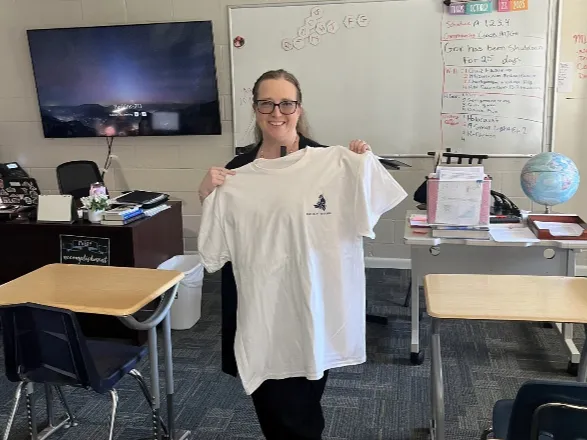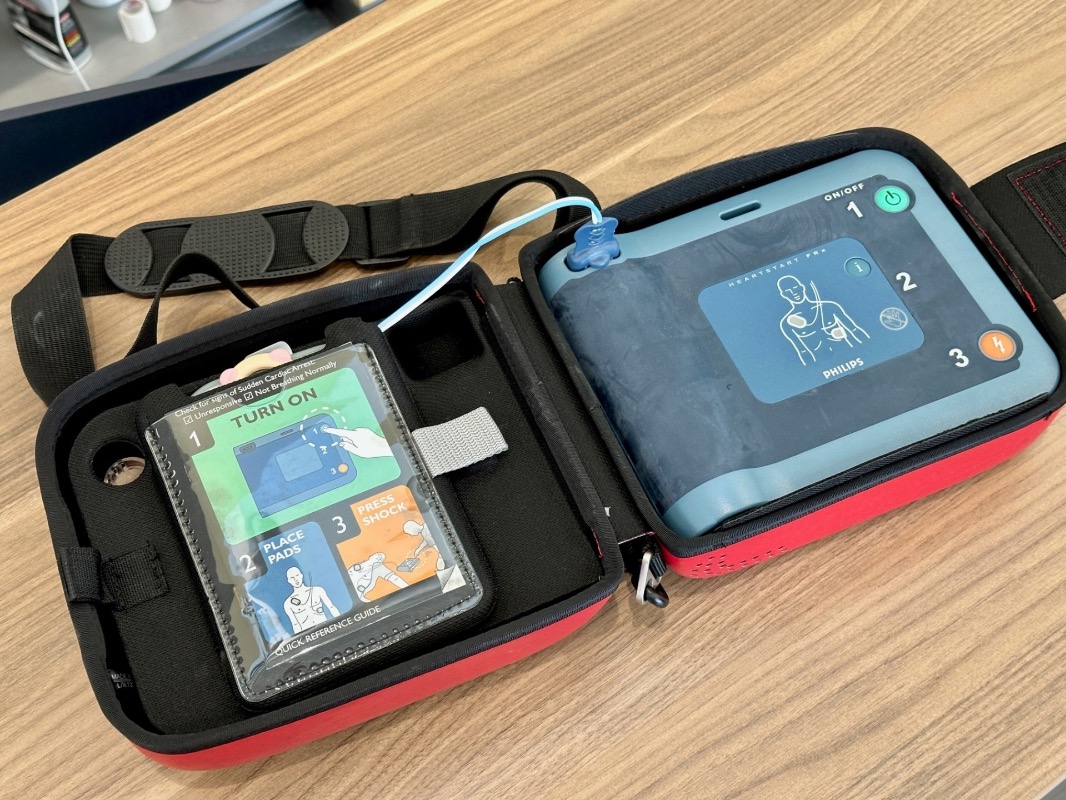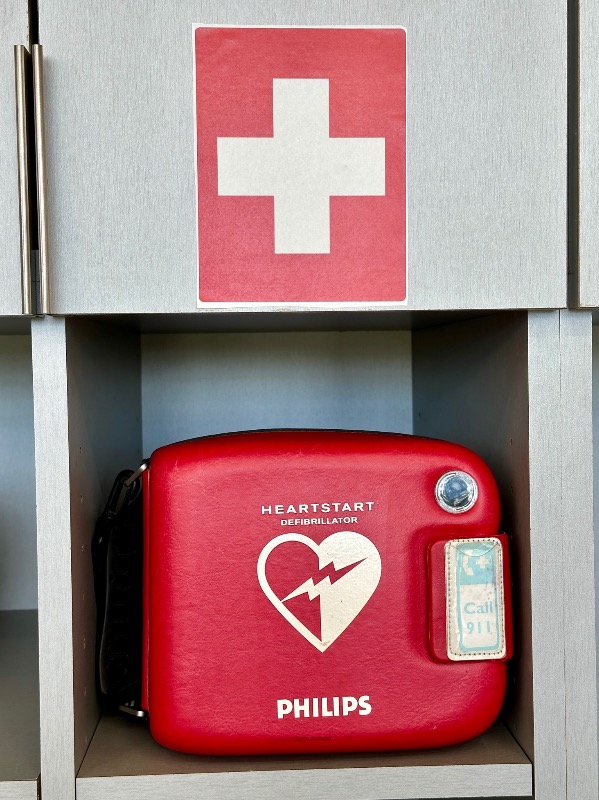- Admission
- Discover Episcopal
- Our Program
- Athletics
- Arts
- Spirituality
- Student Life
- Support Episcopal
- Alumni
- Parent Support
- Knightly News
- Contact Us
- Calendar
- School Store
- Lunch Menu
« Back
Athlete Safety Precautions are a Must in School Athletics
February 3rd, 2023
 Coach Wally Stevens with the weight room automated external defibrillator (AED).
Coach Wally Stevens with the weight room automated external defibrillator (AED).
“We take cardiac events very seriously.” Episcopal athletic trainer Dean Mannina had a unique perspective when watching Bills Safety Damar Hamlin collapse on the field in sudden cardiac arrest. “It just makes me think, be prepared,” he says. “Have a good plan.”
Mannina has been Episcopal’s athletic trainer for 17 years. When he joined the staff, the school owned six automated external defibrillators (AEDs) donated by the Episcopal Parents’ Guild. An AED is available in the nurse’s office, the Chapel, the Visual & Performing Arts Center, the Greer Center in Lower School, the business office in Perkins Hall and the athletic trainer’s medical kit. In addition, Squires donated four more AEDs to ensure that each athletic facility, including both gyms, the Field House and the baseball/softball fields, has a freestanding device. Mannina says it is important to have these devices available throughout the school campus because the recommendation for AED distribution is that a device is within three minutes of a possible event. “Time is important,” he says. “For every minute you don’t get a defibrillator on, your chance of survival decreases by 10%.”
“It can save a life.”
The portable, lightweight AEDs are easy to use and easily accessible. Mannina says the device talks the user through the procedure. The school nursing team maintains the devices to ensure they are in working order. Having the proper equipment for a cardiac emergency is important, but it’s only a portion of the story. Mannina says all Episcopal coaches are trained in CPR and AED use. The athletic department also has an established emergency action plan in place. Before the start of each school year, the team rehearses scenarios and discusses roles and responsibilities.
That preparedness is something that Mannina takes seriously as an athletic trainer. He says whether he attends a practice or a game, an AED is inside his medical kit. “I bring it with me everywhere I go,” says Mannina. That kit also includes emergency supplies such as splints, gauze, over-the-counter medications and tape. In addition, he updates his certifications every two years to stay current on best practices and emergency procedures.
Heart Screenings for Student Athletes
In the case of Hamlin’s sudden cardiac arrest, physicians believe it was due to a rare condition known as commotio cordis. According to the American Heart Association, this is a “phenomenon in which a sudden blunt impact to the chest causes sudden death in the absence of cardiac damage.” Hamlin is making remarkable progress in his recovery in part because of the response of the team’s athletic trainers and physicians. “They followed the plan,” says Mannina. Because of the nature of commotio cordis, Mannina says there is not really a way to test for it or predict who may experience it. However, there is a reliable method for determining whether an athlete has hypertrophic cardiomyopathy (HCM).
The American Heart Association lists hypertrophic cardiomyopathy as a “hereditary disease in which the heart muscle becomes thickened and stiffened, making it more difficult for the heart to pump blood.” The condition may put young athletes at risk for sudden cardiac arrest. For many years, Mannina and the Episcopal coaches have arranged screenings for student athletes. Now, through the “Save A Heart. Save A Life.” initiative, the Louisiana Pediatric Cardiology Foundation (LPCF) provides free heart screens for all Baton Rouge area high school athletes. Mannina encourages families to take advantage of this opportunity, which includes an EKG and an echocardiogram. The recommendation is that athletes are screened twice in high school, usually in the ninth and eleventh grades. To schedule a screening, contact LPCF at 225-768-2590 or [email protected].
Athlete safety is traditionally a behind-the-scenes component of any sport or competition. Occurrences such as Hamlin’s generate awareness and focus on the importance of player safety and the preparedness of athletic trainers and physicians. The hope is that players and fans enjoy a competitive game without the need for these professionals. However, experts like Mannina and specialized equipment, like the AEDs, are on standby if the unthinkable happens.
Schedule a heart screening for your student athlete today!
Louisiana Pediatric Cardiology Foundation
225-768-2590
[email protected]
The Episcopal School of Baton Rouge 2025-2026 application is now available! For more information on the application process, to schedule a tour, or learn more about the private school, contact us at [email protected] or 225-755-2685.
Other articles to consider
 Dec17A Christmas Message from Father Patrick
Dec17A Christmas Message from Father PatrickFather Patrick shares a special message for the season.
See Details Dec12From Service to Song: Lower School Students Celebrate Christmas in Two Languages
Dec12From Service to Song: Lower School Students Celebrate Christmas in Two LanguagesEpiscopal third graders celebrated the season and French heritage with a special holiday program in the Lewis Family Memorial Chapel of the Good Shepherd.
See Details Dec11Upper School Recognizes Excellent Educators
Dec11Upper School Recognizes Excellent EducatorsThis semester, Upper School students recognized teachers who inspire, support and challenge them every day. Congratulations to our Excellent Educator honorees.
See Details Dec11Smashing Goals, Building Community: Episcopal’s Shepherd’s Market Food Drive Success
Dec11Smashing Goals, Building Community: Episcopal’s Shepherd’s Market Food Drive SuccessThe Episcopal Shepherd’s Market Food Pantry “Great Turkey Giveaway” food drive broke records. We’re proud of our students and families for building community through service.
See Details
Categories
- All
- Admission
- Athletics
- College Bound 2019
- College Bound 2020
- College Bound 2021
- College Bound 2022
- College Bound 2023
- College Bound 2024
- College Bound 2025
- Counselors Corner
- Episcopal Alumni
- Giving
- Head Of School
- Lower School
- Middle School
- Spirituality And Service
- Student Work
- The Teachers' Lounge
- Upper School
- Visual And Performing Arts












